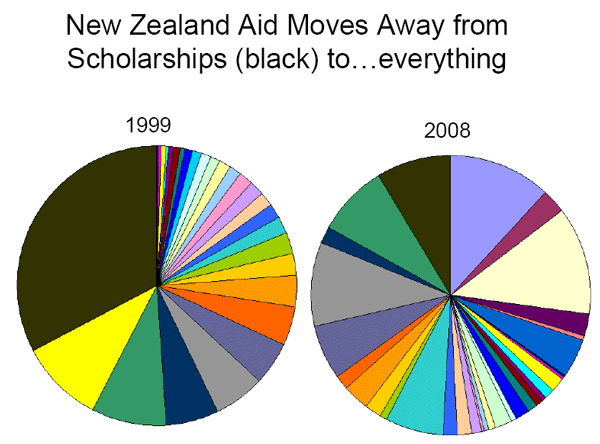Do what you're actually good at? or what you should be good at?
 We have just finished the annual ritual in which Hollywood pretends that its job description is making quality indie movies, instead of what it is actually good at -- producing crowd-pleasing blockbusters. Avatar was not only in the latter category by $2.5 billion or so and counting, it even got good reviews from critics. But it couldn't win Best Picture under Hollywood's hypocritical self-fantasy that rewards what they think they SHOULD be doing.
Wait, I feel another Aid Watch metaphor coming on. How many aid agencies and NGOs have tried to do what they SHOULD be good at, instead of what they are actually good at? Just because a cause is worthy, or of critical importance to development -- does NOT mean that YOU are good at producing what the customers want in that area at a reasonable cost. Women's empowerment, fixing failed states, promoting good governance, community-driven development, social services for the poor -- all sound like things your agency SHOULD do. But where is your evidence that you are any good at doing any of these things? What if you are good at something else?
We have just finished the annual ritual in which Hollywood pretends that its job description is making quality indie movies, instead of what it is actually good at -- producing crowd-pleasing blockbusters. Avatar was not only in the latter category by $2.5 billion or so and counting, it even got good reviews from critics. But it couldn't win Best Picture under Hollywood's hypocritical self-fantasy that rewards what they think they SHOULD be doing.
Wait, I feel another Aid Watch metaphor coming on. How many aid agencies and NGOs have tried to do what they SHOULD be good at, instead of what they are actually good at? Just because a cause is worthy, or of critical importance to development -- does NOT mean that YOU are good at producing what the customers want in that area at a reasonable cost. Women's empowerment, fixing failed states, promoting good governance, community-driven development, social services for the poor -- all sound like things your agency SHOULD do. But where is your evidence that you are any good at doing any of these things? What if you are good at something else?
An interesting case in point is New Zealand aid. Before a major reform, its largest program was givng college scholarships to poor Pacific Islanders. I don't have any decisive evidence on how good they were at doing this, so this example is only suggestive, but a priori a scholarship sounds like a relatively effective way to help somebody help themselves -- the ideal formula in aid. Then the "SHOULD" nannies took over, and now the tiny New Zealand budget is divided among ALL the fashionable causes in development. (The picture below shows the breakdown between 37 possible sectors in foreign aid.)
As the New Zealand example shows (and it is characteristic of most aid agencies), the SHOULD criteria defeats the whole idea of specialization, and even tiny agencies wind up giving 5 percent of the budget each to 20 different causes. Since there are fixed overhead costs of operating in a sector (like employing sector specialists), this means that a lot of the aid budget is going to be wasted on overhead costs.
Who in aid and philanthropy will have the courage to stick to what they are actually good at? and resist pressure to pretend to do what they SHOULD be good at?
 From Aid to Equality
From Aid to Equality

